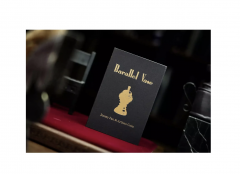Your position: Home > NEW ARRIVALS
- Description
This effect was first published in the Card Magic of Paul Gordon by Paul Gordon, 1996. Here is the Ad Copy:
Effect: he Gordon Diary is simply the best handling of this popular magic effect: A spectator names any date in the year. The performer uses his deck, or a borrowed deck and shuffles it, then a spectator selects a card, which is set aside. The spectator is given a pocket diary and shown that there is a card printed under each date. He/she is instructed to look up his or her selected date, and note the card printed beneath it. When the selected card is turned over, they match!
Easy to do. No stacked or memorized deck. No duplicate diaries. No sleights. No kidding! Simply stick this little diary in your shirt pocket and you are ready to perform any time, with anyone’s deck!
And here is Michael Close’s Review:
I was going to let this manuscript of card tricks fall through the cracks until I received a letter from Mr. Gordon which included what appeared to be an ad for the book. This ad contained some glowing endorsements from some well-known magicians, and, fearing that there would be some of you who would see the ad and be influenced by it, I felt that I must offer a dissenting view.
This 31 page manuscript contains ten tricks which are “personalizations” of the standard repertoire: “The Danson Diary Trick,” Jennings’ “Synchronicity,” Jerry Sadowitz’ “The More Things Change,” Ed Marlo’s “Miracle Aces,” Darwin Ortiz’ “Dream Card,” Ortiz’ “Psychotronic Card,” the “Collectors,” John Bannon’s “New Jack City,” and Ricky Jay’s effect of rapidly producing all 13 cards of a suit – a routine which (as Jim Swain points out in Miracles with Cards) should not be open to variation, since the original has never been published.
For the most, there is nothing bad about Mr. Gordon’s handlings, I just found them to be uninteresting. To coin a phrase from the introduction of this column, they failed to pass Darwin’s First Law. I do want to take a moment to talk about two routines which are very highly hyped in Mr. Gordon’s ad.
The ad refers to “The Gordon Diary Trick” as “the only impromptu version of this now classic effect. There is no memory, sleight-of-hand, stacked deck, or duplicate diaries.” This is true, but…Mr. Gordon uses an arranged deck system devised by Bart Harding. Mr. Harding’s method requires calculation to determine the stack position of any given card. While the deck is not stacked, and can be freely shuffled, it is necessary to spread the deck face-up in order to cull the required card to the top of the deck so it can be forced. In my opinion, this is an inferior procedure. There is no sleight-of-hand (unless you count culling as a sleight) because the card is forced using the cross-cut force. This is an inferior procedure. (Roger Croswaite suggests avoiding these procedures by forcing the card using the Lorayne “Moving Pencil” force.) So, here’s what we’ve got: The stack is Bart Harding’s, the method of preparing the diary is Simon Aronson’s, the effect is Ted Danson’s, and the better handling is Roger Croswaite’s. My question is: why is the title “The Gordon Diary Trick?”
The other routine which receives a lot of hype in the ad is the “Millenium Collectors” which “has an amazing ‘no contact’ approach and is easy to do.” It is the phrase “no contact” which bothers me. In this routine three selected card are apparently placed on top of the deck. This is done so that one of them can be switched out via a double lift. The aces are then switched out using ATFUS, a procedure in which the aces are drawn onto the top of the deck. Then, the selected cards are replaced into the deck, and then the ace packet is dropped onto the top of the deck. The aces are then spread, showing they have collected the selections. As Douglas Adams would say, “This is apparently a new meaning of the word ‘contact’ with which I am unfamiliar.”
Effect: he Gordon Diary is simply the best handling of this popular magic effect: A spectator names any date in the year. The performer uses his deck, or a borrowed deck and shuffles it, then a spectator selects a card, which is set aside. The spectator is given a pocket diary and shown that there is a card printed under each date. He/she is instructed to look up his or her selected date, and note the card printed beneath it. When the selected card is turned over, they match!
Easy to do. No stacked or memorized deck. No duplicate diaries. No sleights. No kidding! Simply stick this little diary in your shirt pocket and you are ready to perform any time, with anyone’s deck!
And here is Michael Close’s Review:
I was going to let this manuscript of card tricks fall through the cracks until I received a letter from Mr. Gordon which included what appeared to be an ad for the book. This ad contained some glowing endorsements from some well-known magicians, and, fearing that there would be some of you who would see the ad and be influenced by it, I felt that I must offer a dissenting view.
This 31 page manuscript contains ten tricks which are “personalizations” of the standard repertoire: “The Danson Diary Trick,” Jennings’ “Synchronicity,” Jerry Sadowitz’ “The More Things Change,” Ed Marlo’s “Miracle Aces,” Darwin Ortiz’ “Dream Card,” Ortiz’ “Psychotronic Card,” the “Collectors,” John Bannon’s “New Jack City,” and Ricky Jay’s effect of rapidly producing all 13 cards of a suit – a routine which (as Jim Swain points out in Miracles with Cards) should not be open to variation, since the original has never been published.
For the most, there is nothing bad about Mr. Gordon’s handlings, I just found them to be uninteresting. To coin a phrase from the introduction of this column, they failed to pass Darwin’s First Law. I do want to take a moment to talk about two routines which are very highly hyped in Mr. Gordon’s ad.
The ad refers to “The Gordon Diary Trick” as “the only impromptu version of this now classic effect. There is no memory, sleight-of-hand, stacked deck, or duplicate diaries.” This is true, but…Mr. Gordon uses an arranged deck system devised by Bart Harding. Mr. Harding’s method requires calculation to determine the stack position of any given card. While the deck is not stacked, and can be freely shuffled, it is necessary to spread the deck face-up in order to cull the required card to the top of the deck so it can be forced. In my opinion, this is an inferior procedure. There is no sleight-of-hand (unless you count culling as a sleight) because the card is forced using the cross-cut force. This is an inferior procedure. (Roger Croswaite suggests avoiding these procedures by forcing the card using the Lorayne “Moving Pencil” force.) So, here’s what we’ve got: The stack is Bart Harding’s, the method of preparing the diary is Simon Aronson’s, the effect is Ted Danson’s, and the better handling is Roger Croswaite’s. My question is: why is the title “The Gordon Diary Trick?”
The other routine which receives a lot of hype in the ad is the “Millenium Collectors” which “has an amazing ‘no contact’ approach and is easy to do.” It is the phrase “no contact” which bothers me. In this routine three selected card are apparently placed on top of the deck. This is done so that one of them can be switched out via a double lift. The aces are then switched out using ATFUS, a procedure in which the aces are drawn onto the top of the deck. Then, the selected cards are replaced into the deck, and then the ace packet is dropped onto the top of the deck. The aces are then spread, showing they have collected the selections. As Douglas Adams would say, “This is apparently a new meaning of the word ‘contact’ with which I am unfamiliar.”









